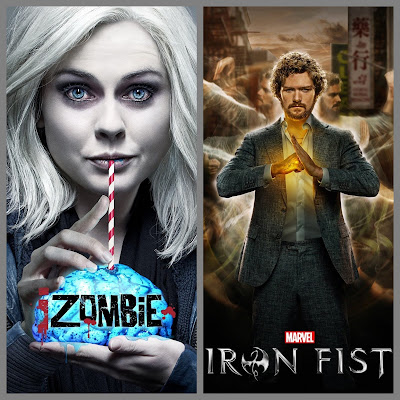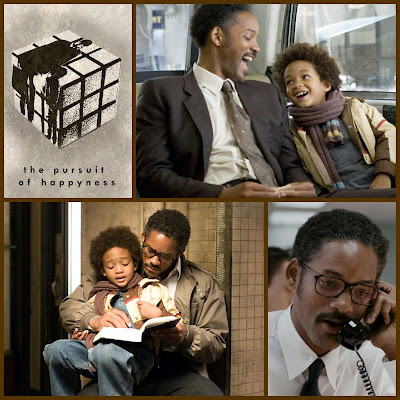AMERICAN GODS EPISODE 2 REVIEW: THE SECRET OF SPOONS
★★★★☆
Two episodes into American Gods and I have had to watch them both a couple of times before I even understood what the hell was going on.
Both episodes start with Mr. Ibis inscribing “Coming To America” in black and white, because American Gods is an immigrants’ story as much as it is a fantasy tale and a road epic. But as “The Secret Of Spoons” demonstrates from its opening sequence to its conclusion, very little is as clear as black and white. Not every “immigrant” story is the same. Some of our diverse nation’s community descended from people who didn’t immigrate by choice. They were kidnapped en masse and enslaved by people who arbitrarily designated themselves worthy of owning other human beings.
The unwilling passengers in the dark hold on which “The Secret Of Spoons” opens aren’t immigrants, and they aren’t passengers; they’re captives. Not prisoners. That’s a word we commonly associate with prison and crime and courts; these people have been accused of no crime and certainly see no justice.
The shackles, the darkness, the crowded conditions—these physical conditions are brutal enough. But this scene is effective at conveying the horrors of slavery without the (truthful but potentially exploitative) scenes of whipping, hard labor, and bodily harm. The man who invokes Anansi’s name is as appalled as he is afraid, and with good reason. Mr. Nancy confirms his worst fears, then introduces fresh ones. It’s not only these men’s bodies that will come to harm—though they have and they will, though Mr. Nancy says his supplicant’s mother has already been cast overboard for fighting off her would-be rapists—but their freedom, their families, their future.
With their lives and their descendants’ lives consigned to misery and murder, Mr. Nancy urges, what possible reason have they not to set the ship aflame and slit the throats of their captors? When a man objects—burning the boat means dying themselves—his reply, delivered with terrible, bright-eyed truth, evokes centuries of uprisings and protests, from Haiti to Watts: “You already dead, asshole. At least die a sacrifice for something worthwhile. Let the motherfucker burn.”
At first glimpse, the scenes in the shabby Chicago walk-up where the Zorya sisters and Czernobog live (exist might be a better word for what these dispirited gods do here) seem to have an almost Kubrickian symmetry. When Wednesday and Czernobog face off, when Shadow and Czernobog play chess, they sit in profile, framed by the windows and long draperies, a dingy chandelier hanging above them. But look again. Director David Slade knows the power of a world that’s slightly off-kilter.
The most symmetry, the most predictability, in “The Secret Of Spoons” is found in the superstore where Shadow pick ups supplies. But it’s there, within the flat planes and banality of the mega-mart, that Shadow’s whole world begins to tilt. In the novel, Media (Gillian Anderson) approaches Shadow in the guise ofLucy Ricardo—not Lucille Ball—as he drowses in a hotel room. Staging this conversation in a store aisle instead is a smart move. It keeps the action moving by combining Shadow’s shopping with Media’s attempt at persuasion. It allows a grander spectacle as she overtakes the banks of display screens. It removes the possibility that he’s dreaming.
Maybe most importantly, putting this confrontation in public forces Shadow to contain his confusion unless he wants to make himself conspicuous—which he doesn’t. When Lucy speaks to Shadow, and only to Shadow, he’s forced to acknowledge a rift in the reality he thought he knew. Real and imaginary, sane and mad, possible and impossible: None of those boundaries are as black and white as he believed before Wednesday come into his life. Even Lucy pushes at the borders of the black-and-white box that should contain her.
Anderson’s transformation into Lucy is a triumph of costuming, cosmetic arts, and character work. Anderson roughs up her voice, but instead of attempting pure mimicry, she melds that characteristic smoker’s voice with the mellifluous pandering that Media thrives on. Lucy’s blowing smoke, and I don’t just mean from her sponsor’s cigarettes. The old gods are hucksters, grifters, and barkers, but they acknowledge their setbacks. Maybe the new gods’ thirsts are still slaked by the public’s unknowing sacrifices to them (“Time and attention, it’s better than lamb’s blood,” Media tells Shadow) or maybe they’re just blandly duplicitous. Either way, they’re full of blithe, empty assurances that ring false.
There’s something comforting about the irascibility and frank age of Wednesday’s old friends, however unwelcoming or gloomy they are. Yes, Zorya Vechernyaya (Cloris Leachman, giving the Evening Star both a forbidding glare and a submerged twinkle) greets them with, “He don’t going to be happy to see you.” But she also refuses to send them away when Czernobog, in fact, don’t be happy to see them. As Czernobog, Peter Stormare is menacing, the sinew and muscle of his bare arms belying his claims of weakening, but he’s also playful and grudgingly appreciative of Shadow’s spirit.
In his new uncertainty of this world, Shadow is as adrift as the nameless crowd of African men Anansi incites to righteous rebellion, even at the cost of their own lives. He’s been seduced, not kidnapped, and he has more freedom and more choices. But he’s just as unmoored, and maybe just as beguiled. But that isn’t the only reason he takes Czernobog’s deadly wager, whatever he says.
In this newly revealed world of gods and magic, where a sitcom icon pushes at the boundaries of her TV screen, where a strapping leprechaun snatches gold from an invisible horde, there’s a homey appeal in a game of checkers. Even more than there might be in a game of chess (and American Gods’ fateful checkers game surely alludes to The Seventh Seal’s chess game) because, as Shadow observes, in checkers, “every man’s an equal.” There’s comfort in reducing the world back to black and white, if only for a few minutes, if only by risking his life.








Comments
Post a Comment